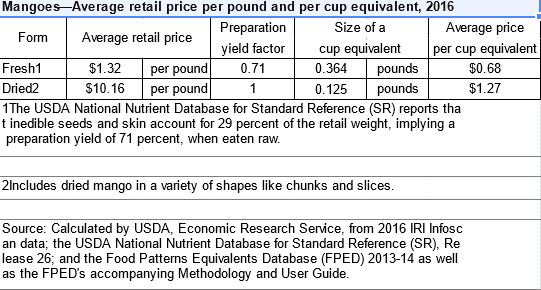How Much Does Mango Cost?
Last Updated on March 18, 2023
Written by CPA Alec Pow | Content Reviewed by ![]() CFA Alexander Popinker
CFA Alexander Popinker
The mango is a succulent, juicy fruit that comes in many varieties. It’s commonly found throughout tropical countries and has been the basis for many cuisines across communities around the world.
How much do mangoes cost per pound?
The price of mango varies depending on a number of factors including where you live, the season in which you are purchasing it, and its type. If we take into consideration that on average these tropical fruits weigh about 4 ounces or 114 grams (depending on size), you can purchase mango for as little as $1.50 per pound if living in a tropical climate during summer months to $2.50-$4 per pound during wintertime when they are out of season and harder to find.
You might also like our articles about the cost of cornstarch, potatoes, or almond milk.
Dried mangoes can cost up to $9 per pound depending on the time of year and store/market you purchase from. Amazon offers seven-pound bags of mangoes for about $35 or close to five dollars a pound.
For just a little over $25, you can purchase 20 ounces of Philippine Dried Mangoes from Amazon.com
The USDA researched the average retail price per pound and the per cup equivalent and this information can be found below:

Details on mangoes
Mangoes are delicious low-calorie fruits that are high in Vitamin A and potassium, making them great for your vision. There are six varieties available: the Ataulfo, Francis, Haden, Keitt Kent, and Tommy Atkins. You can usually purchase mangos in bulk packages that come with netted bags for safe transporting as well as keeping them fresh.
How to pick the best mango
When a ripe mango is squeezed, it will slightly move.
A peach and an avocado are also similar to mangos because as they grow old, their skins become softer, which means that they’re ready for picking.
When picking out your favorite, always judge by feel, not color, because red doesn’t necessarily mean ripe when it comes to all species of mangos. Ripe mangoes will often have a fruitier aroma on the stems.
How should mangoes be stored?
A ripe mango will be firm to the touch and emit a sweet aroma when up close. Try not to buy one that has developed sap on its skin or you won’t get much enjoyment from it later; wait for ones with an appealing aroma, as these are normally sweeter tasting than those without any fragrance at all. To prepare your perfect fruit for storage, let it sit out until soft enough before wrapping it in plastic wrap and storing it in the fridge where it can stay fresh for up to five days.
Tiny cut-up pieces of mango can also be frozen, but if they are left in the freezer for too long, then their skin will turn black. However with an air-tight seal on them; they will still be OK to eat for the next 6 months or so.
Important tips to remember
Cutting mango is both an art and a science. You do not want to be wasteful, but you also don’t want your food to go rotten because it’s been sitting in the fridge for too long. Once you’ve identified where the seed is located cut parallel with it until you hit about halfway through – this will allow for easy cutting once opened up later! Now take each half-cut piece and divide it into smaller cubes by creating “patterns” across its surface; after these are done, pop them out.
How much fruit do you need? According to the USDA, for every pound of fleshy fruits like apples or oranges that will be diced up into bite-size pieces, plan on getting close to two cups. Mangoes won’t ripen when stored below 50 degrees Fahrenheit and should instead be kept at 68°F – 72°F.
Is there any way to spend less?
Mangoes are best fresh and should be eaten as soon as possible after purchase. They can spoil easily, so avoid purchasing more than needed to prevent unnecessary expenses at the grocery store.
Whether it’s on the internet or in your local market, you can usually find a bargain when buying mangoes. Compare prices so that you’re not paying more for something than necessary and look out for sales too.

Leave a Reply
Want to join the discussion?Feel free to contribute!